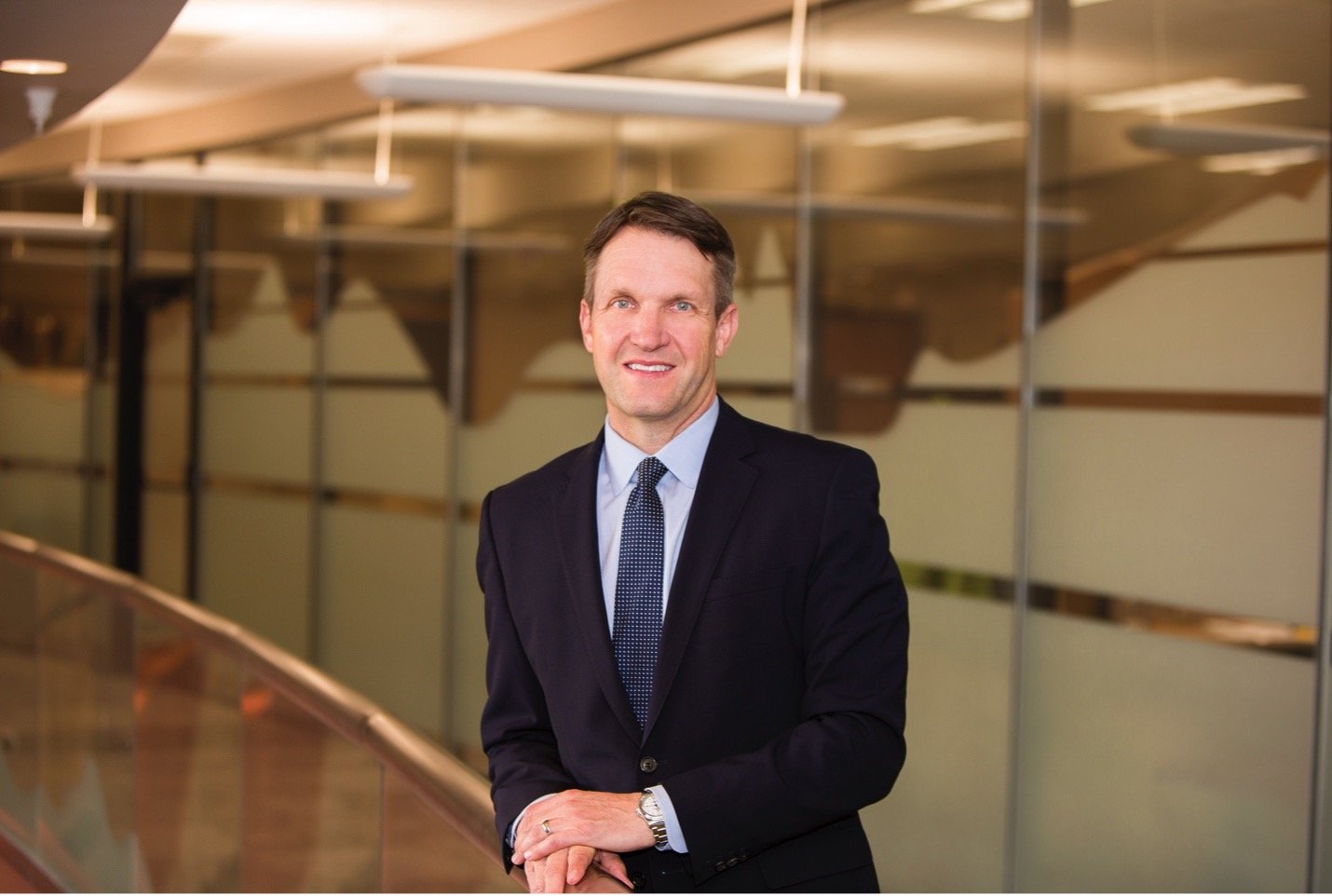Editor's note: This blog was written by Ultradent President & CEO Dirk Jeffs as part of the From the Desk of Dirk Jeffs series.
I was a little starstruck, finding myself seated right next to Peter Schutz, former president and CEO of Porsche. Ultradent founder, Dr. Dan Fischer had recently attended a CEO peer group where Peter spoke about his now-famous “hire character, train skill” philosophy. If you know Dan, it shouldn’t be hard to imagine him greeting Peter with a vigorous handshake and immediately inviting him to visit our headquarters in Utah. Also, if you know Dan's charm, it shouldn’t be hard to imagine that Peter agreed. A few of Ultradent’s leaders were arranged around a table in the Wasatch conference room, excited and eager to learn from this renowned business leader who had transformed an iconic brand. It felt like we were hitting the big time.

But I was anxious.
As the clock ticked over to the meeting start time, the honor of Peter’s presence at our headquarters was matched by my embarrassment. Here was a brilliant, important man who had flown a great distance at the behest of our founder, yet some of our staff had not arrived on time. If Peter noticed the few empty chairs, he didn’t address it directly. He did, however, launch the day’s discussion by lauding the virtue of punctuality. As I checked my watch for the fiftieth time in five minutes, the last of the latecomers strolled in, giving explanations that trailed off under the weight of Peter’s steely stare. Even those of us who had arrived on time were squirming in our chairs.
Leaders who keep their employees waiting can be seen as disrespectful or offensive, despite elevated status.
Having spent so much of his career in Germany, Peter may have been influenced by pünktlich, the German concept of punctuality. There, people are expected to arrive 5-10 minutes early so the meeting can begin promptly at the hour. According to Geert Hofstede’s study of cultures across modern nations, Germans have a lower power distance than even famously casual Americans, meaning they are less deferential to authority and expect to be treated as equals. Leaders who keep their employees waiting can be seen as disrespectful or offensive, despite elevated status. A famous example of German dedication to punctuality was reported a few years ago when Vladimir Putin visited German Chancellor Angela Merkel. He was late. She cancelled the meeting.
I must have some German DNA.
While I have never lived in Germany, I was raised by my father, a stern-faced, soft-hearted educator and principal. In his profession, punctuality was vital to preventing chaos. A teacher showing up late would put a burden on other staff, besides setting a terrible example for the children. Tardy students interrupt lessons and daily flow. The way to run the system like clockwork is to follow the clock. He made it very clear to his own children that punctuality was important—a character-defining trait—and we didn’t want to disappoint him, ever.
When I ask someone for their time, I take it seriously, approaching it as though I were asking them for money.
There are two important resources available to people: money and time. Sadly, it often seems that when we have one, we don’t have the other (and when we have neither, we’re in the worst spot). Of the two, time seems more valuable to me. We can’t earn more grains of sand in our personal hourglasses; once given or taken, our time can’t be replaced. When I ask someone for their time, I take it seriously, approaching it as though I were asking them for money. Likewise, when giving my time, I evaluate whether it’s a wise investment. In my view, people who are constantly late rob others of a finite resource. It’s disrespectful, agitating, and sad.
I’ve learned that my mode of interacting with time is called “monochronic time.” This mode views time as linear, productivity as paramount, and schedules as key. I can be admittedly dogmatic about this subject and perhaps a little unforgiving—especially when it involves leaders, who I hold to a higher standard.
 Time is the one resource that can’t be replaced
Time is the one resource that can’t be replaced
Another attitude toward time, “polychronism,” emphasizes personal relationships, multitasking, and acceptance of spontaneous events. Latin America is culturally polychronic, viewing time as flexible and allowing space for unpredictability. During my travels to Latin America, I have frequently been the first one to arrive at an event, sometimes waiting more than an hour past the published start time for other guests to arrive. Everyone else seems to have a mental formula for calculating the acceptable arrival time, but I haven’t managed to align with their tempo yet. I don’t know that I ever will.
Is there a way for monochronics and polychronics to work together while signaling respect for each other?
As a global company, we at Ultradent collaborate with people who view time in both ways. People like me will always feel frustrated when colleagues are late. It can put me behind or cause chaos in my schedule. It feels inconsiderate. People who lean toward polychronism will often feel slighted by an insistence on punctuality. They may prefer to engage more deeply, living in the moment without checking their watches. When someone cuts a conversation short for the sake of schedule, a polychronic may interpret it as a lack of care.
 Dirk Jeffs, President & CEO of Ultradent Products, Inc.
Dirk Jeffs, President & CEO of Ultradent Products, Inc.
Is there a way for monochronics and polychronics to work together while signaling respect for each other? Here are my suggestions for compromise:
Slow down.
When a monochronic’s day is scheduled with back-to-back meetings, every encounter has the potential for being cut short during a pivotal point in the conversation. This can offend the polychronic. When a polychronic attempts to fill every minute of their day with multitasking, they will often be late for every meeting on their schedule, thus offending the monochronic. Schedule buffer time between commitments that can be used for overflow, if needed. Resist the temptation to start another activity during the buffer time. Instead, write down notes about the previous encounter or contemplate the next one.
Travel like your grandparents.
Have you ever noticed that elderly people have a tendency to arrive excessively early? This can serve both monochronics, who want to avoid undue stress, and polychronics, who crave time to connect with other people. Build plenty of travel time into your schedule—more than you think you’ll need—and you’ll be less affected by traffic, parking, or getting lost on the way. If you arrive early, you can strike up a conversation, call a loved one, read a book, work on a project, or meditate.
Rely on an ally.
For a polychronic, it can be highly uncomfortable to terminate a conversation during a moment of connection. Find an ally who can be ruthless about knocking on your office door when you need to leave for your next commitment. Then, offer to resume the current conversation later. On the other hand, a monochronic’s obligation to punctuality might distract them from a conversation that’s going unexpectedly long, preventing them from truly engaging. Find an ally who can make schedule adjustments or apologize on your behalf, when necessary. Even better, find an ally who can act as a substitute for you in the next meeting, if the situation is justified.
Of course, there will be unexpected circumstances. That's life. And of course, even a staunch monochronic like myself will be late sometimes. Make punctuality the rule and tardiness the exception. Apologize sincerely when you're late and offer a respectful explanation. Remember that time is a precious resource, regardless of your relationship with it. If you are chronically late for no good reason, stop it!
To my fellow monochronics, please continue to hold high expectations of punctuality that will improve efficiency, but try not to take it personally if your colleagues occasionally miss the standard. After all, even Germany's Deutsche Bahn arrives late from time to time.
* Porsche and Deutche Bahn are trademarks of third parties. Ultradent is not affiliated with, endorsed or sponsored by the owners of these trademarks.







